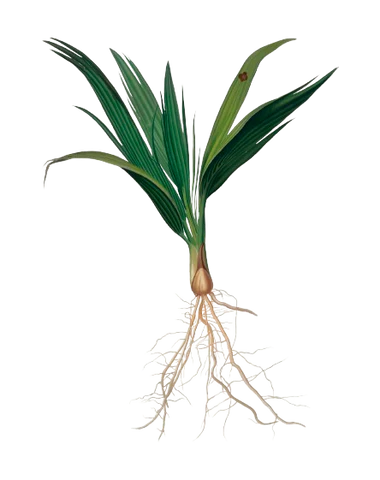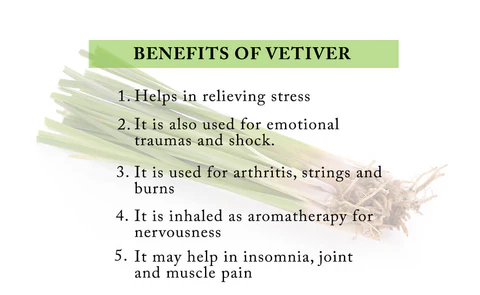
Discover the Secrets of Vetiver: A Natural Remedy for Health and Beaut
Vetiver roots, derived from the Vetiveria zizanioides plant, have been used for centuries in traditional medicine and aromatherapy. These long, thin roots boast a rich, earthy aroma and a multitude of health and beauty benefits.
1. What are Vetiver Roots?
• Vetiver roots are the underground parts of the Vetiveria zizanioides plant, also known as vetiver grass.
• They are prized for their aromatic properties and therapeutic effects.
2. Historical Significance
• Vetiver roots have a long history of use in various cultures, including Ayurveda and traditional Chinese medicine.
• They have been valued for their ability to promote relaxation, reduce stress, and improve skin and hair health.

3. Cultivation
• Vetiver grass is native to India but is now cultivated in various tropical regions worldwide.
• The roots are harvested after approximately 12 to 18 months of growth.
Benefits of Vetiver Roots
Vetiver roots offer a wide range of benefits for both physical and mental well-being. Understanding these benefits can help individuals incorporate vetiver into their daily routines effectively.
1. Skincare Benefits
• Vetiver essential oil is renowned for its ability to promote skin regeneration and reduce the appearance of scars and blemishes.
• Its antibacterial properties make it effective in treating acne and other skin conditions.
2. Haircare Benefits
• Vetiver oil can strengthen hair follicles, reduce dandruff, and promote healthy hair growth.
• Its cooling properties soothe the scalp and provide relief from itching and irritation.
3. Stress Relief
• The earthy aroma of vetiver has a grounding effect that helps alleviate stress and anxiety.
• Diffusing vetiver essential oil or using it in aromatherapy massages can promote relaxation and mental clarity.

Uses of Vetiver Roots:
Vetiver roots can be incorporated into various products and routines to reap their benefits for health and beauty.
1. Aromatherapy
• Vetiver essential oil can be diffused in the air or added to bathwater to create a calming atmosphere.
• Its woody scent helps induce relaxation and promotes better sleep.
2. Skincare Products
• Vetiver oil is a common ingredient in natural skincare products such as creams, lotions, and serums.
• Its antioxidant properties help protect the skin from environmental damage and premature aging.
3. Haircare Treatments
• Adding a few drops of vetiver essential oil to shampoo or conditioner can nourish the scalp and strengthen hair strands.
• DIY hair masks containing vetiver oil can improve hair texture and shine.
Cultivation of Vetiver Roots
Growing vetiver grass requires proper care and attention to ensure a healthy yield of roots.
1. Climate and Soil Conditions
• Vetiver thrives in warm, tropical climates with well-drained soil.
• It can tolerate drought conditions but prefers regular watering.
2. Propagation
• Vetiver can be propagated from seeds or by dividing mature plants.
• Planting should be done during the rainy season to facilitate root establishment. 3. Harvesting
• Vetiver roots are typically harvested 12 to 18 months after planting.
• Care should be taken to extract the roots without damaging the plant’s rhizome system.
Must-Have Secrets for Maximizing Vetiver Benefits
To make the most of vetiver roots, consider these essential tips and tricks.
1. Quality Matters
• Choose high-quality vetiver essential oil from reputable sources to ensure purity and potency.
• Look for organic and sustainably sourced products for optimal results.
2. Dilution Ratios
• When using vetiver essential oil topically, dilute it with a carrier oil to avoid skin irritation.
• A typical dilution ratio is 2-3 drops of vetiver oil per teaspoon of carrier oil.
3. Patch Testing
• Before applying vetiver oil to larger areas of the skin, perform a patch test to check for allergic reactions.
• Apply a small amount of diluted oil to the inner forearm and wait 24 hours for any adverse reactions.
Conclusion:
Vetiver roots are a versatile and valuable natural remedy with numerous benefits for health and beauty. By understanding how to cultivate, extract, and utilize vetiver effectively, individuals can enhance their well-being and incorporate this ancient botanical into their daily routines. Whether diffused in the air, applied to the skin, or used in haircare treatments, vetiver roots offer a holistic approach to wellness that has stood the test of time.

Frequently Asked Questions (FAQs)
1. What Does Vetiver Smell Like?
Vetiver has a distinct earthy aroma with woody and smoky notes, often described as deep, grounding, and slightly sweet.
2. Is Vetiver Safe for Sensitive Skin?
Yes, vetiver oil is generally safe for sensitive skin when properly diluted; however, it’s essential to perform a patch test before using it extensively.
3. Can Vetiver Help with Hair Care?
Yes, vetiver oil can be beneficial for hair care. It can help nourish the scalp, strengthen hair follicles, and promote healthy hair growth.
4. Where Can I Purchase Vetiver Products?
Vetiver products, including essential oils, skincare formulations, and perfumes, are available at natural health stores, online retailers, and specialty shops.
5. How Should Vetiver Essential Oil Be Stored?
To preserve its potency, store vetiver essential oil in a cool, dark place away from direct sunlight and heat sources. Ensure the bottle is tightly sealed to prevent oxidation.
By following these guidelines, you can harness the incredible benefits of vetiver and enhance your health and well-being naturally
← Back to blog
